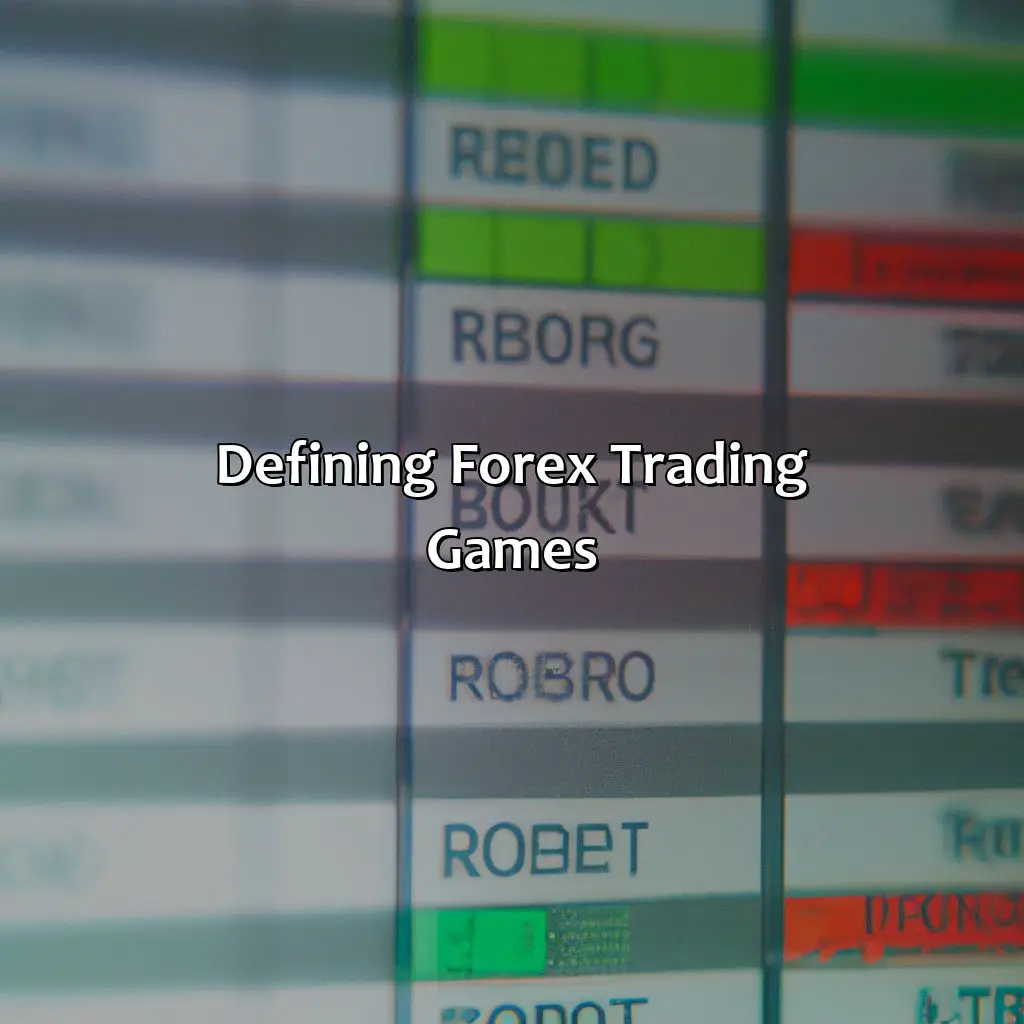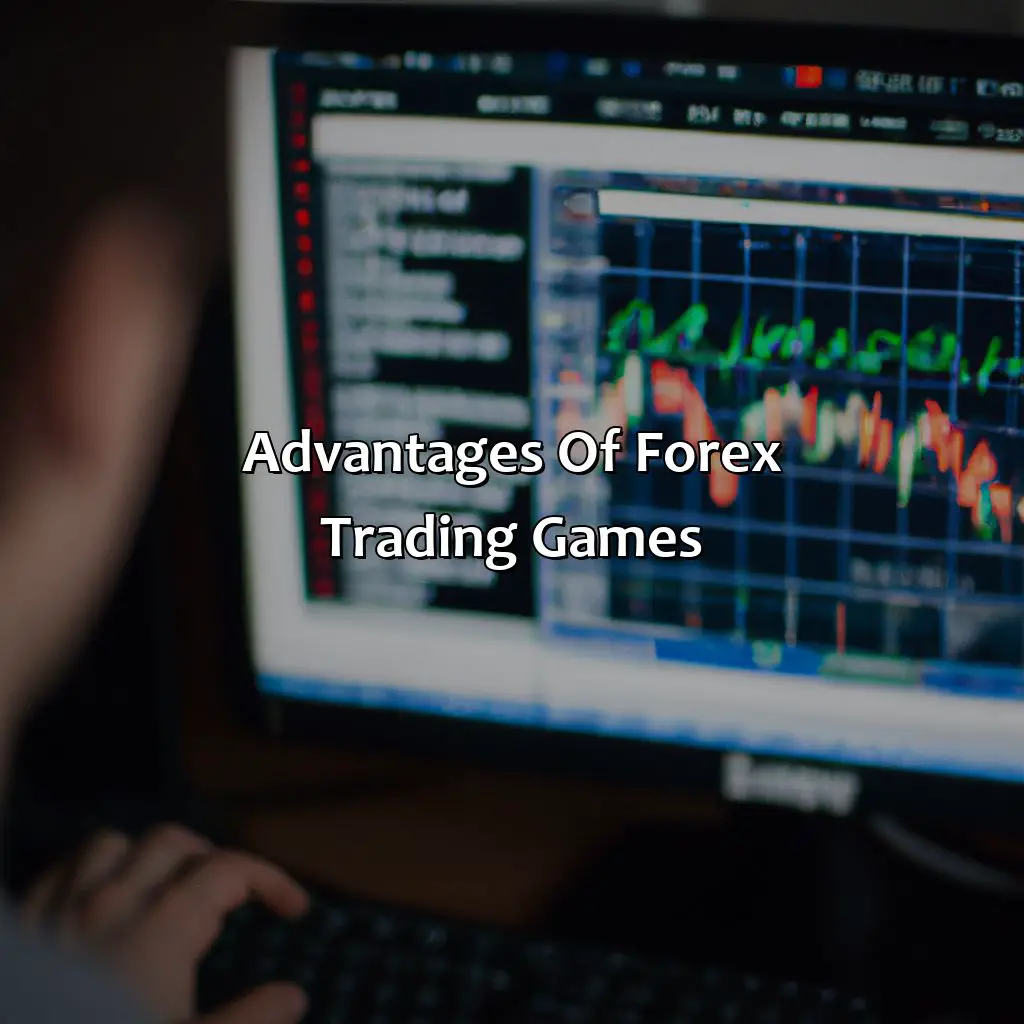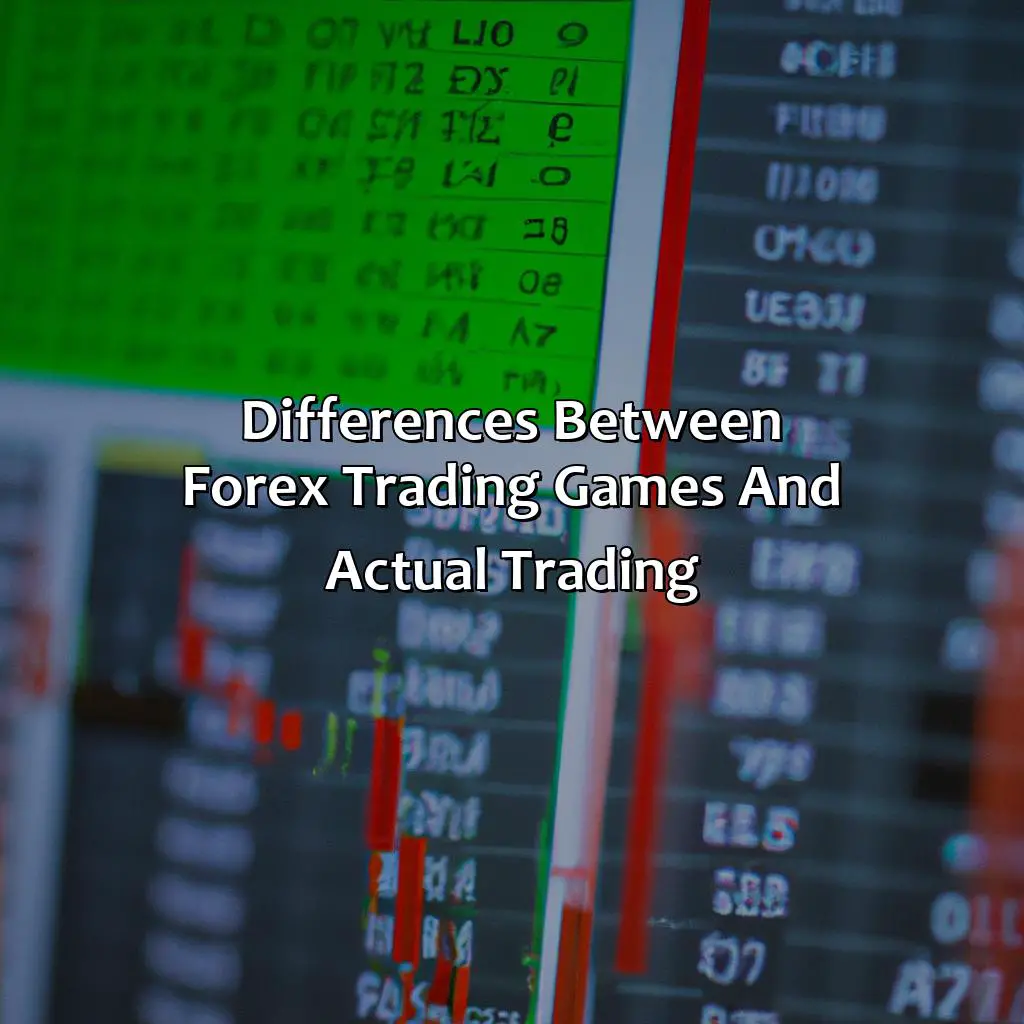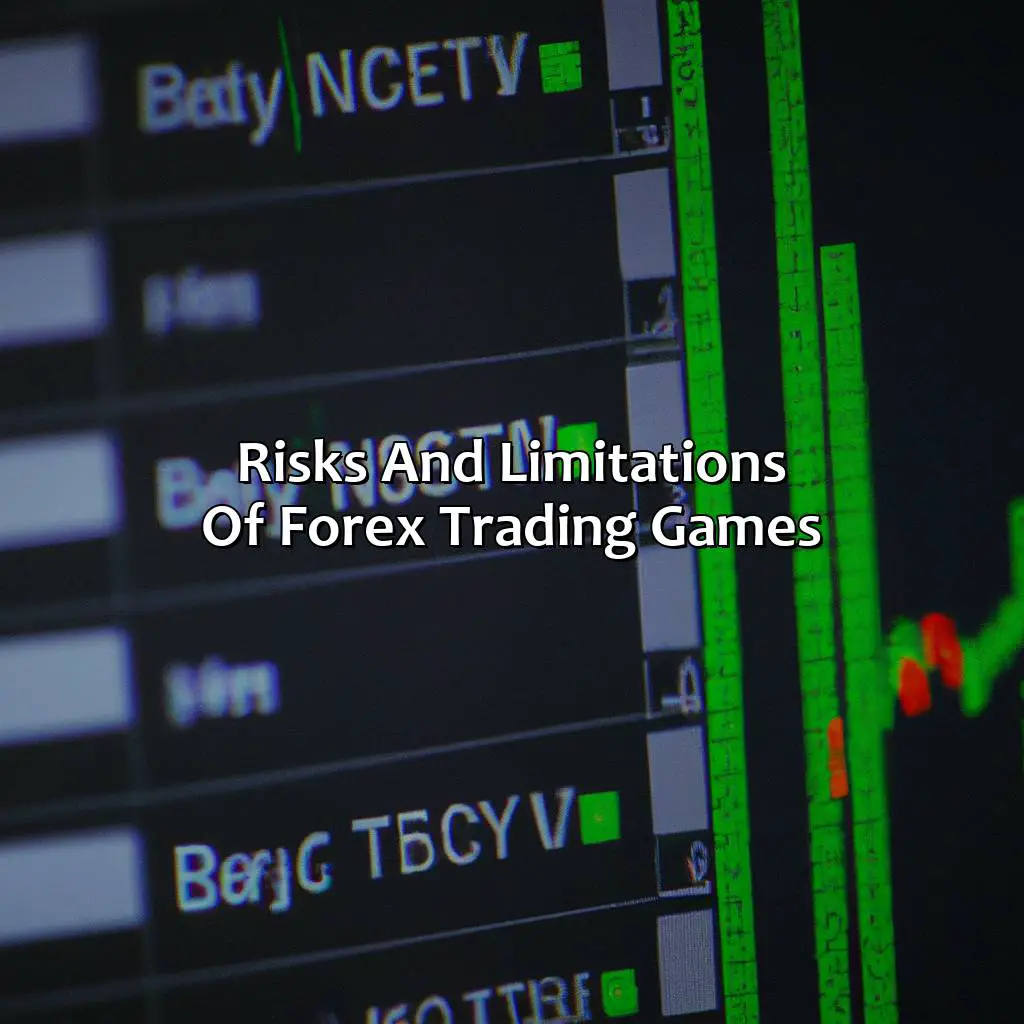
Key Takeaway:
- Forex trading games can provide a valuable tool for novice traders to learn the basics of forex trading, including currency trading, market trends, and forex strategies. Trading simulators and virtual trading platforms offer an opportunity to practice trading without financial risk.
- Forex trading games can improve traders’ analytical skills, including technical and fundamental analysis, and expose them to real-world market dynamics. This can help traders to gain experience and knowledge of the forex industry.
- Forex trading games have limitations and risks, including a lack of psychological impact and unrealistic market conditions. Traders must understand the differences between forex trading games and actual trading, including emotional involvement, broker fees, and slippage, in order to make informed decisions.
Defining Forex trading games

Photo Credits: forexbrokerreport.com by Henry Gonzalez
Forex trading games refer to virtual trading simulators designed to mimic real-life scenarios of trading in the foreign exchange market. These simulations allow individuals to refine their trading strategies by playing with virtual currencies in a simulated trading environment, without risking any real money.
When it comes to identifying the true potential of these trading games, it is essential to analyze their features and functionalities. These trading simulations come in various forms and are designed to offer trading experience almost identical to that of a real market.
Moreover, virtual trading simulations provide traders an opportunity to test their strategies and approaches before they dive into live trading. They also develop a trader’s psychological skill set and help in creating a trading roadmap.
It is crucial to note that trading games are not a substitute for actual market experience, but they are an essential tool for gaining real market experience. The simulations are designed to closely mimic the real market’s behaviour, and thus they can provide valuable insights into the dynamics of the forex market.
Lastly, to make the most out of forex trading games, individuals should look for those that provide realistic market scenarios and enable them to test a broader range of trading strategies. Furthermore, traders should create a trading plan and stick to it, even while trading on the simulators. This approach will help in refining the strategy and developing situational awareness, which is crucial for making informed decisions.
Advantages of Forex trading games

Photo Credits: forexbrokerreport.com by Billy Allen
Gaining an edge in the fast-moving forex market needs skills and knowledge. That’s why forex trading games with virtual currencies are becoming more popular. They offer a no-risk chance to practice trading and refine your analytical abilities.
Here, we’ll talk about the advantages of these games to understand the trends in the forex market. Plus, you also get to learn important technical and fundamental analysis. And, you can make mistakes without any financial damage.
Improving analytical skills
Having a good command of analytical skills is of utmost importance for Forex traders. By utilizing technical analysis, fundamental analysis, and forex charts to make informed trading decisions, forex traders can optimize their profits. Trading games provide an excellent platform for improving these skills through simulated trading experiences. Traders can experiment with different strategies, analyze various market trends and indicators, and recognize patterns that could lead to future profit opportunities.
In such games, traders get exposed to various scenarios where they learn how to think critically and develop well-researched opinions about market conditions. They get an opportunity to apply their analytical skills in practical situations without putting any real money at risk. As long as participants follow an organized approach by making informed trading decisions based on accurate information and trends, they can gradually improve their analytical skills.
Although some may argue that the digital nature of trading games does not provide a realistic experience compared to actual Forex trading, it still holds substantial advantages. Unlike live Forex trading, where chance plays a considerable role in the outcome of investments, the virtual environment allows traders to experiment with ideas and concepts without fear of financial loss.
It is essential to note that while Forex trading games provide a unique learning experience for traders looking to improve their analytical skills, some limitations do exist. The psychological impact of risking actual capital cannot be simulated accurately in these games. Furthermore, virtual market conditions may be vastly different from the real-world dynamics present in live Forex trading.
To sum up, practicing with Forex trading games can serve as a preliminary stepping-stone towards becoming a successful trader by providing valuable knowledge about market trends and gaining significant expertise in fundamental and technical analysis techniques. However, it should not be used solely as preparation without understanding basic risks associated with actual live trades regardless of previous game experiences.
Play Forex trading games and you’ll be able to predict market trends better than your broker.
Gaining knowledge of market trends
Experienced forex traders know that understanding forex trading trends is essential to gain an edge in the market. Forex trading games offer a platform to enhance this knowledge without financial risk. Traders can use these games to become familiar with different market conditions and understand how these conditions impact currency valuations. Identifying the trend and predicting its direction are crucial for success in the world of forex trading.
Moreover, forex trading games allow traders to experiment with various trading strategies, such as technical analysis and fundamental analysis, which help them make informed decisions when placing orders in real life. These strategies can be learned by analyzing price movements, chart patterns, economic indicators, and many other factors using virtual money via a game.
However, it’s important to note that relying solely on forex trading games has limitations. Real-world market dynamics differ significantly from simulated ones. Forex brokers have different slippage rules that vary based on liquidity providers’ behavior and banks’ sentiments towards certain currencies. Additionally, emotional involvement plays a significant role in live trading as opposed to mechanical decision-making in the game.
A frequent limitation is over-reliance on game mechanics such as artificial intelligence-based bots, pre-set algorithms or lack of flexibility that doesn’t allow traders to customize their orders precisely as they would like them placed.
For example, Tim started playing a forex trading game last year so he could test his ability at reading market trends without risking any money. While he got better at making predictions using historical data and trend lines, nothing could have prepared him for Black Monday–when markets tumbled due to concerns over global recession–which happened soon after he began his foray into the world of online forex gaming; he lost 30% of his virtual investment even though he correctly predicted the bearish trend early on but couldn’t manage his orders when things started getting out of control.
Forex trading games offer a risk-free playground for traders to learn from their mistakes and hone their risk management skills.
Learning from mistakes without financial risk
Without having to worry about financial losses, traders can learn from their mistakes in Forex trading games. By experimenting with different strategies, they can gauge the effectiveness of their methods and identify any flaws without incurring any real-world monetary risks.
This risk-free environment enables traders to develop effective risk management skills for real-world trading situations. They can gain experience and skillfully manage forex risk, thus reducing their chances of incurring significant losses when they decide to trade with actual money.
Furthermore, while playing these games, traders have access to a wealth of knowledge about various market trends. They can examine historical data and graphs and assess how the market behaved under specific circumstances, which they wouldn’t have access to otherwise without spending large sums of real money.
However, it is crucial to note that relying solely on Forex trading games for experience may not be entirely beneficial. The lack of psychological hazard offered by such conditions may render a trader inexperienced or ill-prepared for the dynamic nature of the actual forex market.
Thus traders should use these platforms as only one tool among several others in developing forex skills through practical participation in actual markets to reduce trading risk. Doing so enables them to choose viable forex strategies that maximize profits while minimizing losses in an ever-changing financial landscape.
Forex trading games may simulate market dynamics, but they can’t replicate the emotional rollercoaster of real trading, including broker fees and slippage.
Differences between Forex trading games and actual trading

Photo Credits: forexbrokerreport.com by Jerry Taylor
Gain new insight on the differences between Forex trading games and actual trading. Check out this section!
Factors such as emotional involvement and real-world market dynamics play a major role in Forex trading.
This part will focus on the effects of trading psychology, the forex industry, trading industry, forex news, trading news, and the international currency market.
It will also discuss broker fees and slippage, along with the function of forex brokers and trading platforms in actual trading.
Emotional involvement
Traders’ emotional response during forex trading games is limited due to the detached nature of these simulated environments. Traders fail to experience real-time reactions and, hence, their capability to foresee responses from their peers may also be deficient. Trading psychology fails to develop as there is no actual risk involved thereby leading to unrealistic conditions that impact a trader’s ability to manage emotions.
Furthermore, forex psychology is impacted by this lack of realism and traders become accustomed to making decisions in a controlled environment. This false sense of security fails to prepare traders for actual trading scenarios where slippages, market fluctuations, and broker fees come into play, causing significant differences in game mechanics versus actual trading.
Studies have shown that relying solely on forex trading games for preparation can lead to overconfidence amongst traders when they soon realize the vast differences once they involve themselves in actual trading scenarios.
Taken from Source – (Chen J., Liu C., Long F., Wang Y., 2020)
Get ready for a reality check: Forex trading games can’t prepare you for the unpredictable twists and turns of the real-world market dynamics.
Real-world market dynamics
Market Dynamics in Real-World Forex Trading
Forex trading games provide an online platform for traders to execute trades and gain expertise without investing their monetary assets. However, such virtual marketplaces lack the volatility and unpredictability of the actual forex industry.
Real-world currency markets have dynamic trends that shift every second. Traders need to analyze news, political events, economic data, and more to make informed decisions about buying or selling currency pairs. The forex market insights help traders to predict price movements and take profitable positions.
The trading industry is complex, with exchange rates affected by numerous factors which vary across different currencies. Brokers play a critical role in bridging the gap between buyers and sellers by executing trades, but they also charge commissions on transactions, causing slippage.
In addition to these factors, forex news influences the currency market significantly. Traders need access to global economic data releases that may impact the value of currencies that they’re trading.
To thrive as a forex trader, one must be able to master these constant shifts in market dynamics and adapt their strategies accordingly.
Suggestions: To gain exposure into real-world forex trading, it’s essential for traders to stay up-to-date with international currency news, monitor exchange rates daily and learn from experienced professionals. It would be wise for beginners to invest in some demonstration software or a private mentor before risking any money on live trades. Additionally, many brokers offer demo accounts with nearly identical conditions found within their regular platforms— these trial accounts can be excellent training tools for those venturing into forex trading.
Forex brokers and trading platforms may take a cut, but at least they won’t cheat on you like your ex.
Broker fees and slippage
Brokers often charge fees and there is a sizeable gap between bid and ask prices, which naturally impacts trading outcomes. The costs and impacts of slippage must be factored in when considering the total investment costs.
| # | Type |
|---|---|
| 1. | Forex broker |
| 2. | Trading platform |
| 3. | Spreads |
| 4. | Commission |
| 5. | Slippage |
Forex trading games do not reflect actual market conditions when dealing with real brokers, such as differences in vendor fees or market dynamics across different platforms.
Some brokers also offer rebates on trades that did not reach profit targets while others may charge for account maintenance or withdrawals after a certain period of inactivity.
A well-known example of this occurred with the Swiss Franc shock of January 2015, where many traders experienced significant losses due to high volatility resulting in waves of automatic margin calls from their brokers – catching retail traders off-guard.
Forex trading games may limit your potential by relying too heavily on trading software and game mechanics, hindering the development of profitable forex strategies.
Risks and limitations of Forex trading games

Photo Credits: forexbrokerreport.com by William Clark
To comprehend the dangers and boundaries of Forex trading, three sections should be taken into consideration as a solution.
- Firstly, you must comprehend the absence of psychological effect on trading and forex mindset.
- Secondly, the unrealistic market conditions of trading simulators, games, apps, etc.
- Lastly, dependence on game mechanics such as platforms, practice, demo, etc.
Lack of psychological impact
The absence of emotional involvement in Forex trading games can have a detrimental impact on traders’ overall trading mindset. Game mechanics and unrealistic market conditions offer an escape from the harsh realities of actual trading, leading to a lack of preparedness for real-world scenarios. In turn, this limits the development of the forex mindset needed to navigate the complexities and uncertainties of financial markets.
However, these games can serve as valuable tools for novice traders looking to gain basic knowledge and strategies before transition into real markets. I once met a trader who had been practicing with Forex trading games for six months before venturing into live trading. Despite his success in the game, he found himself struggling with the intense emotions and psychology involved in live trading. His forex mindset was not adequately developed, resulting in serious draws downs that could have been avoided with proper preparation.
Trading simulators may give a taste of the forex world, but ‘unrealistic market conditions’ mean they’re not quite the real deal.
Unrealistic market conditions
The virtual environment of forex trading games creates unrealistic market conditions that may not be representative of actual market dynamics. Trading simulators and games often offer highly simplified versions of financial instruments, without the complex interplay between global economic factors affecting their value. This limitation makes it challenging to assess the real-world implications of trading decisions better. Forex simulators and apps that offer game-like mechanics can help develop market knowledge, but traders need to understand their limitations.
While trading simulations may teach basic skills related to entering buy/sell orders, understanding market factors such as geopolitical events, inflation rates, etc., is often less effective in a simplified environment. The lack of complexity obscures the possibility of both systemic and local price volatilities and leads to invalid conclusions about long-term profitability. Failing to account for real-world risks can create a false sense of confidence, whereas app-created scenarios fail to communicate the inherent uncertainty in participatiing in forex trading.
Forex trading games can offer an introduction to financial markets, but they should not serve as a substitute for real-world experience or professional training. While it might seem safer or more effective to learn through simulated environments before transitioning into reality, over-reliance on these tools could lead traders vulnerable to major losses while developing strategies. It’s important always to proceed with caution when using any type of forex simulator or app and recognize that no tool can prepare one entirely for all possible scenario that may arise in actual markets.
“Relying solely on forex games for trading practice is like expecting to win a Formula 1 race after only playing Mario Kart.”
Dependence on game mechanics
Relying on the mechanics of a forex game can affect the trader’s perception of real-world market conditions. The lack of full-scale functionality and auto-generated data may not give a real sense of how the platform behaves in actual trading practice. While using demo trading, traders can develop their skills with a forex platform or currency simulator, but it’s important to complement this learning with research and education into real-world markets.
Some experienced traders who have used forex games hold mixed views on their efficacy as training tools. However, many agree on the importance of combining trading knowledge with demo practices to overcome any dependence on game mechanics.
A study by Investopedia showed that integrating online courses with forex practice boosts profitability by 95%. Thus, relying solely on forex games may not be ideal but could prove useful for developing analytical skills in isolation from other sources.
Some Facts About Forex Trading Games:
- ✅ Forex trading games can be helpful for beginners to learn about forex trading. (Source: Investopedia)
- ✅ Forex trading games simulate real market conditions and allow traders to practice risk-free. (Source: DailyFX)
- ✅ Some forex trading games offer real-time market data, which can improve the player’s trading experience. (Source: FXCM)
- ✅ Forex trading games can also be addictive and create unrealistic expectations, leading to losses in real trading. (Source: Forbes)
- ✅ It is important to use forex trading games as a learning tool, not as a substitute for real trading experience. (Source: The Balance)
FAQs about Are Forex Trading Games Realistic?
1. Are Forex trading games realistic?
Yes, Forex trading games are designed to simulate real-life trading as closely as possible. They often use real-time data and incorporate global events, such as political instability, natural disasters, and economic recessions, which can affect currency values. However, they may not replicate the emotional aspect of trading, including factors such as greed, hope, and the decision-making process sometimes leading to irrational decisions.
2. Can Forex trading games help me understand the real-life trading?
Yes, Forex trading games can be a good starting point for those who want to understand the basics of trading. They provide a risk-free environment for beginners to practice and test their strategies before entering the real trading world. However, it is essential to note that trading in real life involves more significant risks than in a Forex trading game.
3. How do Forex trading games differ from real-life trading?
Forex trading games often do a great job of simulating real-life trading, but they are not exactly the same. Real-life trading involves emotions, stress, and the risk of losing real money, which can impact decision-making. Additionally, factors such as slippage, latency, and broker commissions, which are not present in Forex trading games, can impact real-life trading.
4. Can Forex trading games prepare me for unexpected events like natural disasters or political instability?
Yes, Forex trading games can help prepare you for unexpected events such as natural disasters, geopolitical situations, or economic recessions. Simulating these events in Forex trading games can help traders understand the market’s reaction to such events and prepare to react accordingly in real-life trading situations.
5. Is it possible to make real profits in Forex trading games?
No, Forex trading games are not designed to make real profits. They are primarily intended for educational purposes and to provide practice to the traders. The risks involved in real-life trading are not present in Forex trading games.
6. Do Forex trading games have any benefits for experienced traders?
Yes, Forex trading games can be beneficial to experienced traders to test new strategies and ideas without risking real money. Additionally, playing Forex trading games can help traders hone their decision-making and risk management skills by replicating real-life trading situations and experience.

